 Last updated: May 27th, 2021 6:56 PM
Last updated: May 27th, 2021 6:56 PM
MGNREGA Telangana
The Mahatma Gandhi National Rural Employment Guarantee Act – 2005 (MGNREGA) was initiated to enhance livelihood security in rural areas by providing at least 100 days of guaranteed wage employment in a financial year to every household whose adult members volunteered to do unskilled manual work. Thus, MGNREGA is a powerful instrument for ensuring inclusive growth in rural India through its impact on social protection, livelihood security and democratic empowerment. In this article we will look at Details of Telangana Mahatma Gandhi Rural Employment Guarantee Scheme.Goals of MGNREGA
- Social protection for the most vulnerable people living in rural India by providing employment opportunities.
- Livelihood security for the poor through creation of durable assets, improved water security, soil conservation and higher land productivity.
- Drought-proofing and flood management in rural India
- Empowerment of the socially disadvantaged, especially women, Scheduled Castes (SCs) and Schedules Tribes (STs), through the processes of a rights-based legislation.
- Strengthening decentralised, participatory planning through convergence of various anti-poverty and livelihoods initiatives.
- Deepening democracy at the grass-roots by strengthening Panchayat Raj Institutions.
- Effecting greater transparency and accountability in governance.
Key Stakeholders – MGNREGA
Mahatma Gandhi NREGA (MGNREGA) involves roles and responsibilities of a large number of stakeholders from the village to the national level. The key stakeholders are:Village Level Key Stakeholders
Wage seekers
Wage seekers are the primary stakeholders of the Programme. Their exercise of rights and demand for work are the main triggers of key processes.Gram Sabha (GS)
The Gram Sabha (GS) is the principal forum for wage seekers to raise their voices and make demands.Gram Panchayat (GP)
The GP is the pivotal body for planning and implementation. Programme Officer (PO) is required to allot at least 50 per cent of the works in terms of cost to the GPs for implementation.Block Level Key Stakeholders
Programme Officer
The PO acts as a coordinator for Mahatma Gandhi NREGS (MGNREGS) at the Block level. The primary responsibility of the PO is to ensure that anyone who applies for work gets employment within 15 days.District Level Key Stakeholders
District Programme Coordinator (DPC)
The DPC is responsible for the implementation of the scheme in the district, in accordance with the provisions made in the MGNREGA 2005 and rules and guidelines made there under.State Level Key Stakeholders
State Government
Responsibilities of the State Government include:- Make Rules on matters pertaining to State responsibilities under Section 32 of the Act.
- Develop and notify the Rural Employment Guarantee Scheme for the State
Centre Level Key Stakeholders
Ministry of Rural Development (MoRD)
The Ministry of Rural Development is the nodal Ministry for the implementation of MGNREGA. The roles and responsibilities of the MoRD are:- Make Rules under the Act
- Issue Operational Guidelines for the effective implementation of the Act
- Review list of permissible works under MGNREGA in response to demands of Stat Government.
Civil Society Key Stakeholders
Civil Society Organisations (CSOs) working at the grass-roots can play a very significant role in awareness generation among wage-seekers and in supporting and building capacities of GPs and State Governments in planning, implementation and social audit of MGNREGA.Other stakeholders
- Members of Social Audit Unit, Vigilance and Monitoring Committees
- Technical Staff of implementing agencies
- Departments with whom MoU has been signed for convergence with MGNREGA
Job Card
The Job Card is a key document that records workers entitlements under MGNREGA. It legally empowers the registered households to apply for work, ensures transparency and protects workers against fraud.Registration of Households to get Job Card
- A wage seeker and his family members can register under this scheme by submitting an application at the Gram Panchayat.
- A register maintained at the gram Panchayat will be sent to the Mandal Computer Centre (MCC) for entry of the wage seeking household information.
- The MCC allocates a Job card ID that is an 18-digit identification number consisting of 14-digit habitation code (District, Assembly, Mandal, Gram Panchayat, Village and Habitation) and a 4-digit household running serial number.
- A Job card shall be generated for each household and handed over to the Gram Panchayat.
- The gram Panchayat completes the job card by affixing the photograph of the household duly attesting the same and hands it over to the household.
Online Application for New Job Card in Telengana
Step 1: Visit this page Telangana NREGA page http://www.nrega.telangana.gov.in/Nregs/ Step 2: Go to Job card option in the menu bar. Select ‘Application’ from drop down menu. Image 1 MGNREGA Telangana
Step 3: In the next page select your District, Gram Panchayat, Mandal, Habitation from the drop down menu.
Image 1 MGNREGA Telangana
Step 3: In the next page select your District, Gram Panchayat, Mandal, Habitation from the drop down menu.
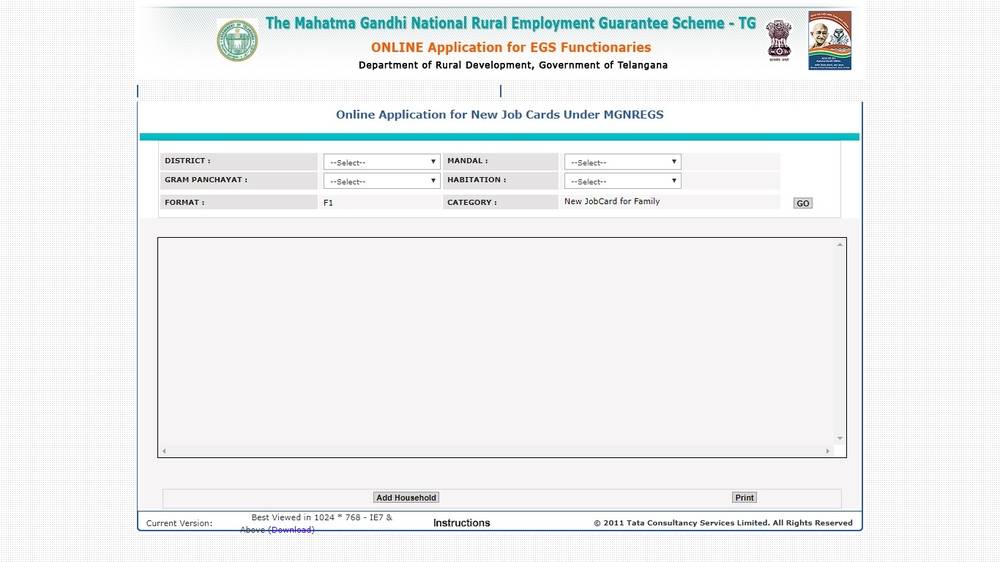 Image 2 MGNREGA Telangana
Step 4: Click on "Go". The names of wage seekers will be displayed.
Image 2 MGNREGA Telangana
Step 4: Click on "Go". The names of wage seekers will be displayed.
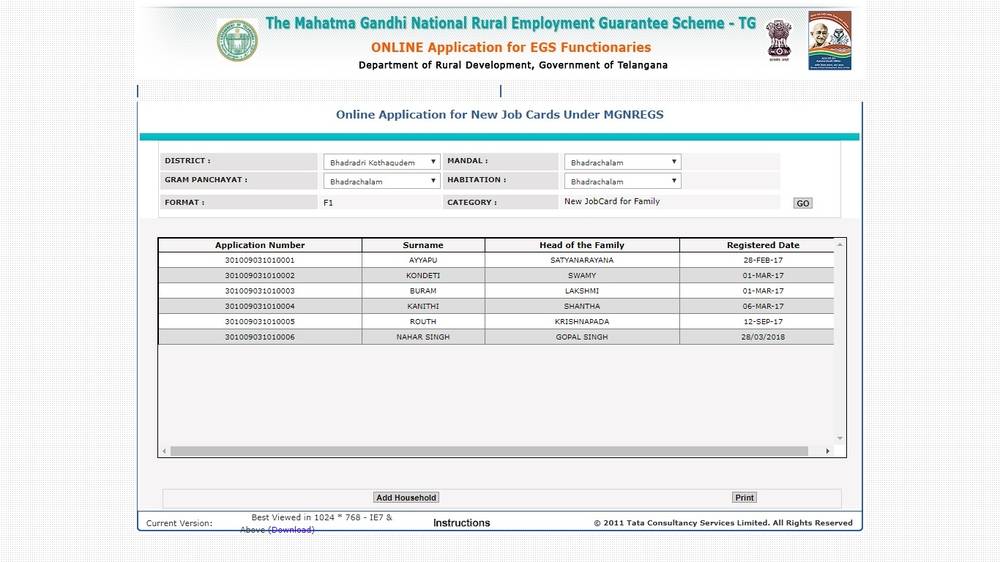 Image 3 MGNREGA Telangana
Step 5: Click on Add household. It will redirect to next page.
Image 3 MGNREGA Telangana
Step 5: Click on Add household. It will redirect to next page.
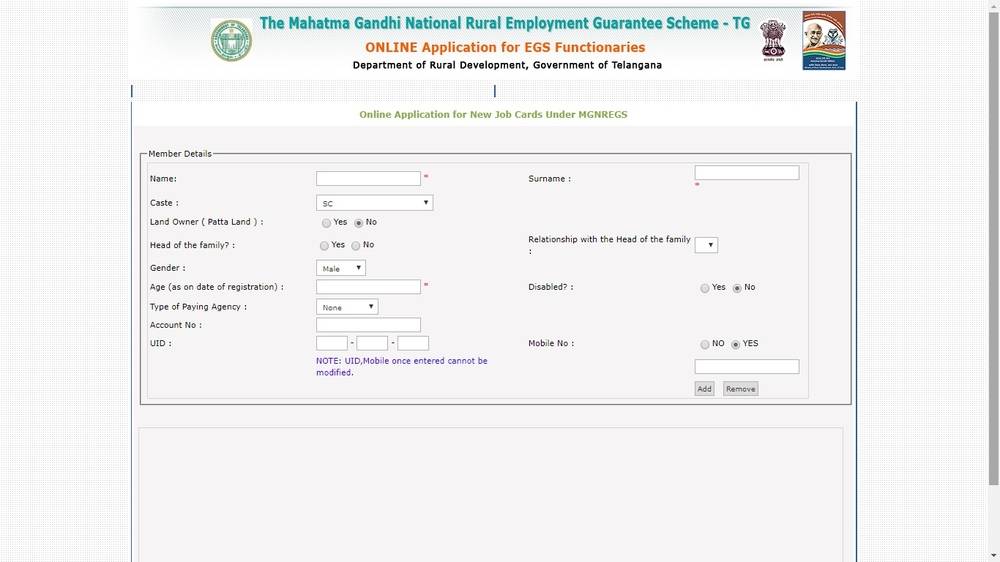 Image 3 MGNREGA Telangana
Step 6: In this page you need to enter below given information’s.
Image 3 MGNREGA Telangana
Step 6: In this page you need to enter below given information’s.
- Name & Surname
- Caste
- Whether you are a land owner or not
- Head of the family or not
- Relationship with head of the family
- Gender
- Age
- Disabled?
- Type of paying agency
- Account number
- UID
- Mobile Number
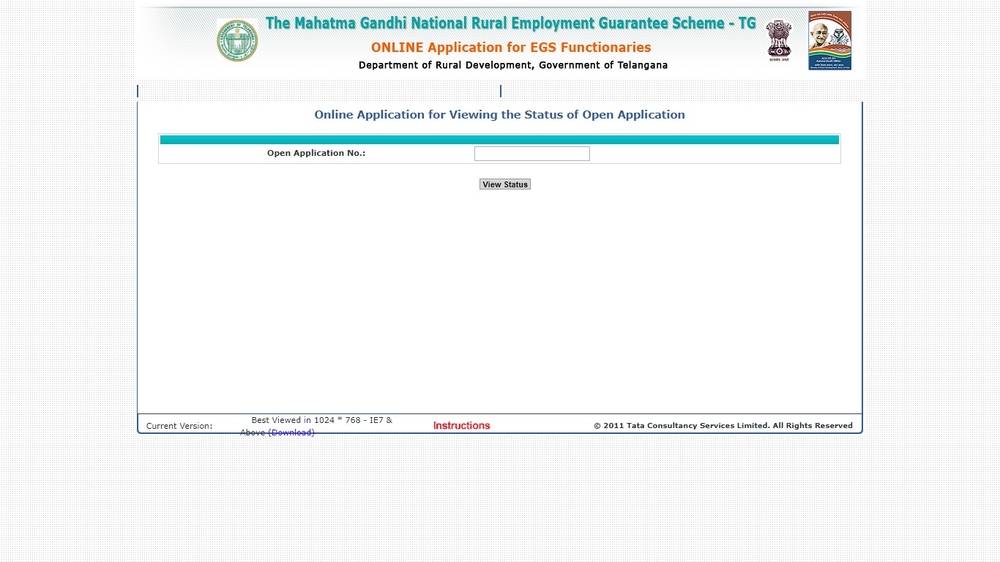 Image 3 MGNREGA Telangana
Step 9: Enter your Application number and click on View status to view your application status.
Image 3 MGNREGA Telangana
Step 9: Enter your Application number and click on View status to view your application status.
Validity of Job card
The Job Card is valid for a period of five years and will have provision for the addition/deletion of members eligible to work.100 Days Work with Job Card
- Every adult member of a registered household whose name appears in the Job Card (JC0) can be entitled to apply for unskilled manual work.
- A wage seeker willing to work can go to work site directly and perform the work allocated.
- Once a week, the Para-worker prepares the Work Progress Report and submits the report along with the Muster Roll at the Mandal MCC.
- Para worker also gives an acknowledgement slip to each wage seeker duly mentioning the weekly work details for the week.
- At the MCC, attendance is captured from the submitted Muster Roll.
- The data is validated and stored in database. Based on the reported progress of work and the number of person-days spent, payment to the workers is computed and a Wage List is generated.
- The generated work list is then sent to the village Panchayat and the paying agency can be either the village Panchayat or Post Office, PO savings account or Bank account whichever is convenient to the wage seeker.
Download Consolidated Muster Rolls
Step 1: Go to this link. The details of any household can be viewed by providing the Job card ID. Step 2: The 18 digits Job card ID can be entered directly or alternately, district, Mandal, gram Panchayat and village of particular household can be selected by using dropdown menu and at the end, the last four digits of the HH ID can be entered.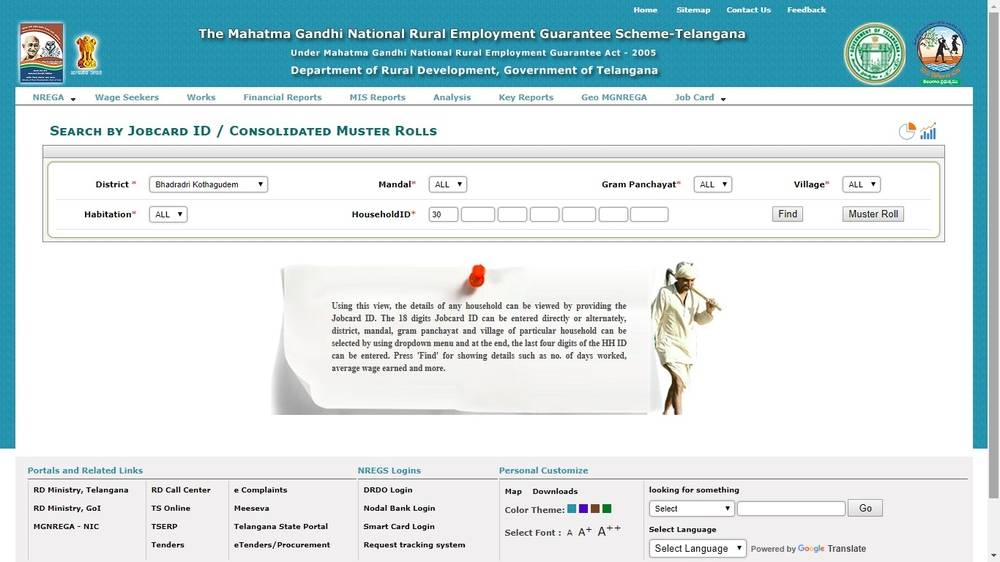 Image 6 MGNREGA Telangana
Step 3: Press 'Find' for showing details such as no. of days worked, average wage earned and more.
Image 6 MGNREGA Telangana
Step 3: Press 'Find' for showing details such as no. of days worked, average wage earned and more.
View your Muster Rolls & Payment
Step 1: Visit this page Telangana NREGA page http://www.nrega.telangana.gov.in/Nregs/ Step 2: Select Muster rolls under Works option.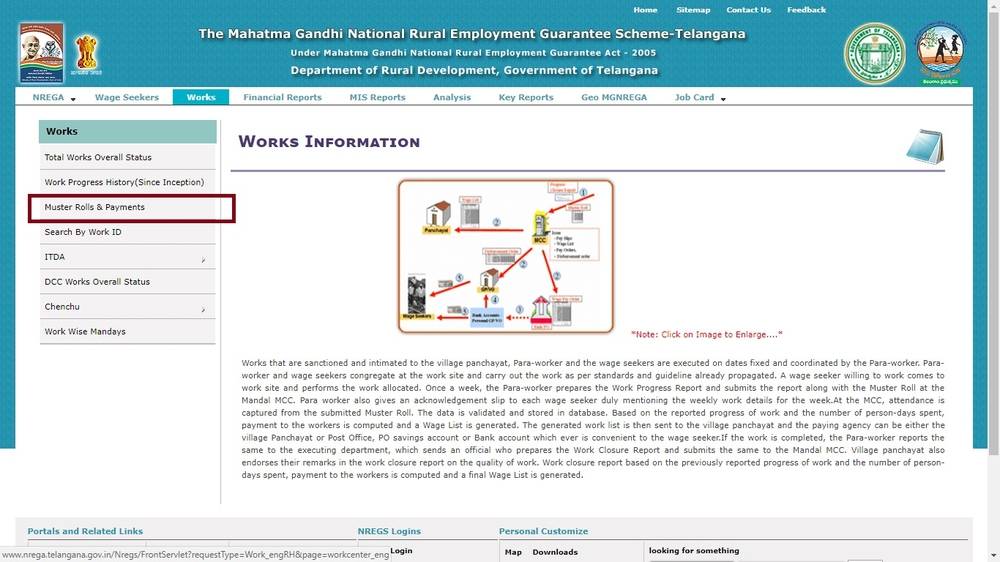 Image 7 MGNREGA Telangana
Step 3: Select the details district, Mandal and Gram Panchayat and village
Step 4: Press 'GO' for displaying the view.
Image 7 MGNREGA Telangana
Step 3: Select the details district, Mandal and Gram Panchayat and village
Step 4: Press 'GO' for displaying the view.
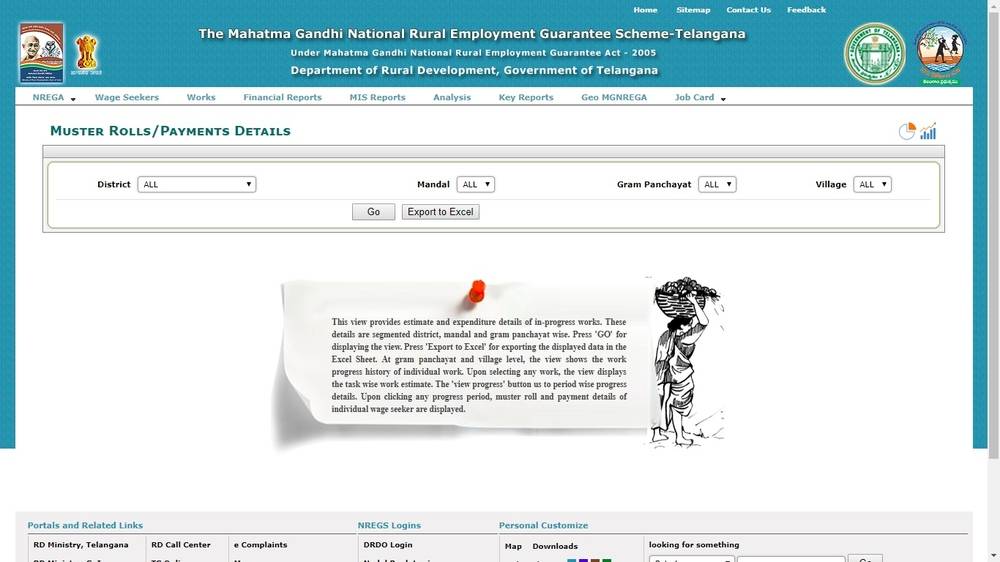 Image 8 MGNREGA Telangana
Step 5: Press 'Export to Excel' for exporting the displayed data in the Excel Sheet.
Step 6: Select any work; the view will display the task wise work estimate.
Step 7: Clicking on any progress period, muster roll and payment details of individual wage seeker are displayed.
Image 8 MGNREGA Telangana
Step 5: Press 'Export to Excel' for exporting the displayed data in the Excel Sheet.
Step 6: Select any work; the view will display the task wise work estimate.
Step 7: Clicking on any progress period, muster roll and payment details of individual wage seeker are displayed.
Popular Post

In the digital age, the convenience of accessing important documents online has become a necessity...

The Atalji Janasnehi Kendra Project that has been launched by the Government of Karnataka...

The Indian Divorce Act governs divorce among the Christian couples in India. Divorce...

When an individual has more than a single PAN card, it may lead to that person being heavily penalised, or worse,...

Employees Provident Fund (PF) is social security and savings scheme for employee in India. Employers engaged...


